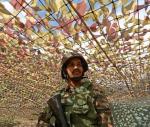You are here
Dead Sea conversations
By Nickunj Malik - May 27,2015 - Last updated at May 27,2015
Since moving to Jordan four years ago, I have visited the Dead Sea endlessly. Sometimes I escorted my guests for a dip in the saline waters and on other occasions I simply drove down from Amman, upon the winding picturesque roads, on a whim. And a prayer, I must add. Because zipping in my sports car, chasing the wind and overtaking every other vehicle on the path, requires a certain amount of enthusiastic daredevilry, followed by a fervent plea for divine intervention.
God is usually on my side, so I’ve not been caught for speeding. Not really. Unless you count the solitary case where a cop let me off after I sang a Shahrukh Khan song. I did not get a ticket therefore that one is not a valid tally. This is what I explained to my husband when he quizzed me later. I could have disregarded the entire incident and kept quiet about it, but long married couples end up admitting all kinds of things to each other. That is a fact, but here I digress.
Last weekend my trip to the Dead Sea was made with a slightly different agenda. I went to participate in the World Economic Forum on the Middle East and North Africa 2015. Well, don’t get me wrong, I did not take part in any of the discussions or televised sessions but I was there as a keen observer. I listened to all the conversations and saw first-hand how conflict resolution can successfully be done through dialogue. Between two opposing parties, that is.
With topics like: creating regional framework for prosperity and peace, the psychology of radicalisation, addressing violent extremism, rebooting the tourism industry, a vision for gender progress, and so on, the plenary halls were crammed with spectators. His Majesty King Abdullah inaugurated the conference and in his speech said: “My friends, we will solve the problems of our region only when we build on our strengths. We cannot be sidetracked by regional turmoil.”
The President of Egypt, Abdel Fattah Al Sisi, addressed the gathering by saying: “Our efforts for ending extremism and terrorism should go side by side with other endeavours for creating a future that is full of freedom, equality and pluralism and which is free from oppression, injustice and exclusion.”
Mahmoud Abbas, the president of the State of Palestine, said: “The relationship between Jordan and Palestine will witness a larger development and more cooperation when the Israeli occupation vanishes and the Palestinian state gains its full independence.”
He was later spotted shaking hands with the ninth President of Israel, Shimon Peres, who reiterated that “a clear majority of Israelis favour a two-state solution” to the conflict with the Palestinians. He pointed out that “arriving at a diplomatic resolution is possible, necessary and urgent”. Peres said: “Together we can turn this region into one that flourishes.”
Klaus Schwab, the founder of the World Economic Forum, made the opening address of the programme and concluded by inviting Hilde Schwab to announce the ‘social entrepreneur of the year’ awards. He claimed, as an aside, that his wife likes to have the last word.
“So does mine,” my spouse remarked.
“What?” I asked.
“Remove your headphones, they are speaking in English, no need for translation,” my husband said.
“This is better,” I exclaimed, pulling the headgear down.
“I told you,” my husband smiled.
“What were you saying earlier?’ I was curious.
“Nothing,” he smiled.
“The most famous last word,” I stated.
Related Articles
Some people have a natural gift. They can be bilingual or even multilingual, and it is fascinating to watch them switch from one language to another without pausing for breath.
Unless one has perfected the subtle art of comic timing, it is extremely difficult to relate a story these days.
Breaking up is hard to do. Several artists like Paul Anka, Tom Jones, Carpenters and Gloria Estefan have, over the years, sang this Neil Sedaka number that was first released in1962.















